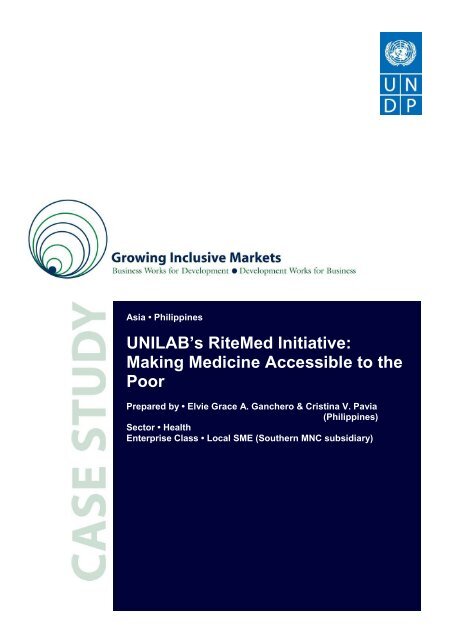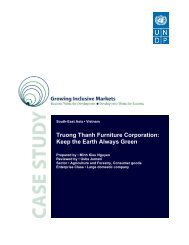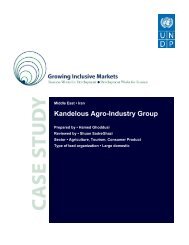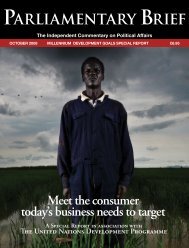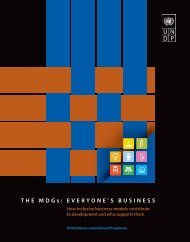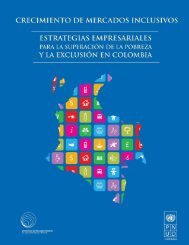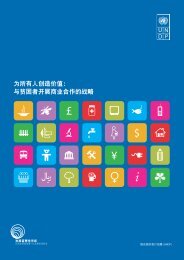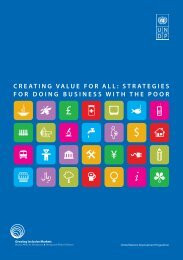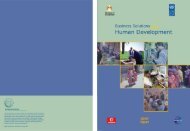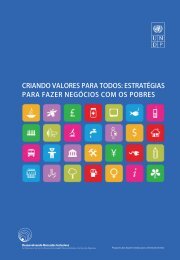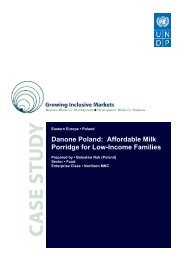UNILAB's RiteMed Initiative: Making Medicine Accessible to the Poor
UNILAB's RiteMed Initiative: Making Medicine Accessible to the Poor
UNILAB's RiteMed Initiative: Making Medicine Accessible to the Poor
- No tags were found...
You also want an ePaper? Increase the reach of your titles
YUMPU automatically turns print PDFs into web optimized ePapers that Google loves.
Asia • PhilippinesUNILAB’s <strong>RiteMed</strong> <strong>Initiative</strong>:<strong>Making</strong> <strong>Medicine</strong> <strong>Accessible</strong> <strong>to</strong> <strong>the</strong><strong>Poor</strong>Prepared by • Elvie Grace A. Ganchero & Cristina V. Pavia(Philippines)Sec<strong>to</strong>r • HealthEnterprise Class • Local SME (Sou<strong>the</strong>rn MNC subsidiary)
SummaryUnited Labora<strong>to</strong>ries, Inc. (Unilab) is <strong>the</strong> oldest pharmaceutical company in <strong>the</strong> Philippines;after starting in 1945, Unilab continues <strong>to</strong> be one of <strong>the</strong> largest. It has manufacturing,distribution and licensing arrangements in nine countries, including China. Its financialsuccess stems from a deliberate strategy <strong>to</strong> offer high-quality and affordably priced healthcareproducts. Seizing an opportunity <strong>to</strong> support <strong>the</strong> Philippine government’s campaign <strong>to</strong> makelower-priced drugs available <strong>to</strong> <strong>the</strong> population, Unilab set up <strong>RiteMed</strong> in 2002, a subsidiarywhose main mission was <strong>to</strong> market and distribute generic medicines. Through economies ofscale, <strong>the</strong> company was able <strong>to</strong> sell generic products 20 <strong>to</strong> 75 percent cheaper than its brandedcounterparts, 1 profitably meeting revenue targets of US$20 million within five years. Itsuccessfully leveraged <strong>the</strong> reputation of its parent company <strong>to</strong> convince Filipinos <strong>to</strong> usegenerics, making quality drugs more accessible <strong>to</strong> <strong>the</strong> poor.Positive Outcomes for <strong>the</strong> <strong>Poor</strong>Access <strong>to</strong> quality medicines for chronic illnesses (e.g. diabetes, hypertension) and lifethreatening diseases (e.g. tuberculosis, heart ailments) that were o<strong>the</strong>rwise unaffordablefor <strong>the</strong> poorThe company’s health education campaign helped <strong>RiteMed</strong> earn public trust of genericdrugs and, at <strong>the</strong> same time, empowered <strong>the</strong> public <strong>to</strong> have more options, including lowercost genericsKey BarriersPerception that cheaper drugs (especially generic drugs) were not effectiveThe marketing practices of branded pharmaceutical products encouraged doc<strong>to</strong>rs andpharmacists <strong>to</strong> prefer branded drugs over generic drugs, even though generic productswere more affordable and of equal qualityKey InnovationsUnilab’s decision <strong>to</strong> lower its profit margin and thus decrease <strong>the</strong> price of drugs; <strong>the</strong>company found a robust and considerably large cus<strong>to</strong>mer base in low-income familiesLeveraging <strong>the</strong> company’s reputation in <strong>the</strong> pharmaceutical industry helped <strong>RiteMed</strong>transform <strong>the</strong> negative public perception about <strong>the</strong> efficacy of low-cost generic drugsSupporting <strong>the</strong> Government’s initiative <strong>to</strong> reduce prices by fifty percent provided astaging point for <strong>the</strong> company <strong>to</strong> reach <strong>the</strong> poor through <strong>the</strong> network of <strong>the</strong> Government’spublic health mechanism as part of its distribution system1 <strong>RiteMed</strong> study, “Effect of <strong>RiteMed</strong> Launch <strong>to</strong> Cost of Drugs in <strong>the</strong> Philippines.”Case Study • UNILAB’s <strong>RiteMed</strong> <strong>Initiative</strong>: <strong>Making</strong> <strong>Medicine</strong> <strong>Accessible</strong> <strong>to</strong> <strong>the</strong> <strong>Poor</strong> 2
Opportunities & Challenges<strong>RiteMed</strong> will continue <strong>to</strong> advocate for <strong>the</strong> use of quality generics and expand its portfolioof products in response <strong>to</strong> <strong>the</strong> unmet need for quality, affordable medicines and healthcarefor <strong>the</strong> poor.<strong>RiteMed</strong> is eyeing opportunities <strong>to</strong> embed <strong>the</strong> community in its core business operationsby learning from Unilab’s experience in forging a partnership with communitiessurrounding its plants <strong>to</strong> repackage certain medicines. The company provides training onhandling and sanitation and offers apprenticeships in working stations in <strong>the</strong> community.This initiative has provided permanent and long-term livelihoods for <strong>the</strong> community forover ten years. The programme has also tapped <strong>the</strong> services of people with disabilitiesthrough Tahanang Walang Hagdan, a foundation for <strong>the</strong> handicapped persons thatparticipate in <strong>the</strong> packaging processes of medicines. <strong>RiteMed</strong> is looking in<strong>to</strong> <strong>the</strong> possiblereplication of this model <strong>to</strong> provide added value <strong>to</strong> <strong>the</strong> community.Unilab is also studying how <strong>to</strong> replicate <strong>the</strong> <strong>RiteMed</strong> model in o<strong>the</strong>r countries where ithas operations. Emerging markets such as Cambodia and Vietnam, where povertyremains a problem and basic health services are not as effective and efficient as compared<strong>to</strong> o<strong>the</strong>r Sou<strong>the</strong>ast Asian countries, would benefit tremendously; Replication would alsooffer an opportunity for Unilab <strong>to</strong> grow.The company will continue <strong>to</strong> foster its relationship with <strong>the</strong> Government as one of itsvital partners, as well as <strong>the</strong>ir commercial partnership with leading drug s<strong>to</strong>res in <strong>the</strong>country.Case Study • UNILAB’s <strong>RiteMed</strong> <strong>Initiative</strong>: <strong>Making</strong> <strong>Medicine</strong> <strong>Accessible</strong> <strong>to</strong> <strong>the</strong> <strong>Poor</strong> 3


